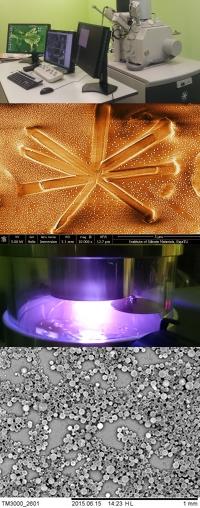Institute of Silicate Materials
During 68 years of activity the Department was headed by such long-standing leaders as Professor Jūlijs Eiduks (1947-1980) and Professor Uldis Sedmalis (1980-1999). Professor Gundars Mežinskis has led the Professor’s Group of Silicate Materials Technology since 1999 (the Group was renamed in 2007 to the Department of Silicate, High Temperature and Inorganic Nanomaterials Technology) and since 2000 he has also led the Institute of Silicate Materials.
Courses devoted to hydraulic and nonhydraulic mortar binders, porcelain, clay and glass production technologies were taught within the study programme «Technical Chemistry» at the Department of Chemistry of Riga Polytechnicum already in the academic year 1866/1867. The course Silicate Technology was entrusted to Maximilian von Glasenapp (1845-1923), who is regarded as the founder of silicate technology science in Latvia. The Department of Silicate Technology was established in 1947. The Institute of Silicate Materials (ISM) was founded in 1994 on the basis of the Department of Silicate Technology. The Department of Silicate Technology became one of the units of ISM and was reorganised into the Professor’s Group of Silicate Materials Technology in 1999. On June 20, 2007 the name of the Department was restored based on the decision of RTU Senate – the Department of Silicate, High Temperature and Inorganic Nanomaterials Technology. This name characterises the strengthened educational and scientific activities.
The main lecture courses in the study specialisation Chemistry and Technology of Silicate and High-Temperature Materials are: Chemistry and Technology of Silicate Materials, Physical Chemistry of High Temperature Materials, Crystallography and Chemistry of Crystals, Mineralogy, Chemistry and Technology of Building Ceramics, Fine Ceramics, Glass and Binders, and Sol-Gel Technology. It is also possible to specialise in Chemical Technology of Inorganic Nanomaterials. In the academic year 2010/2011 admission to an academic Master programme Nanotechnologies of Materials was started. Within this Master’s degree programme the academic staff of the Department ensures 8 lecture courses:
- Research Methods of Nano-Scale Objects
- Inorganic Nanomaterials Chemistry and Chemical Production Methods
- Nanotechnology Standardization and Metrology
- Physical Chemistry of Nanostructured Electroceramics
- Introduction to the Physical Chemistry of Nanostructured Electroceramics
- Oxide Nanomaterials
- Chemistry and Technology of Inorganic Nanoparticles
- Nanoporous Materials
- Nanostructured Thin Films and Sol-Gel Coatings Professor
G. Mežinskis is Director of the programme; it is accredited till December 31, 2018.
Every year Bachelor and Master students are informed about the subjects for their theses. At the department potential themes are selected from the proposals of the academic staff. Additionally, students can propose their own themes, which can be helpful for future career choices. Companies can also propose their topics of interest. Thereby, the themes of Bachelor and Master studies indicate the interests of students and the potential use of their knowledge in the existing industrial sectors or scientific activities of the university

